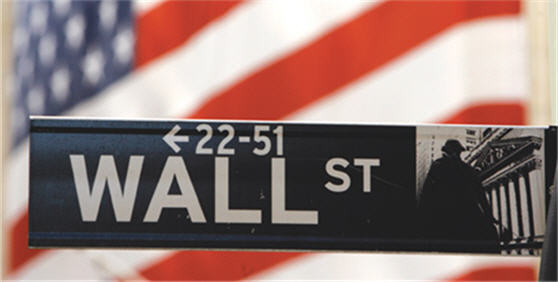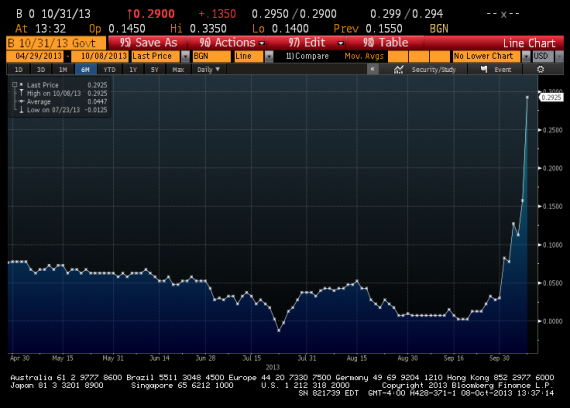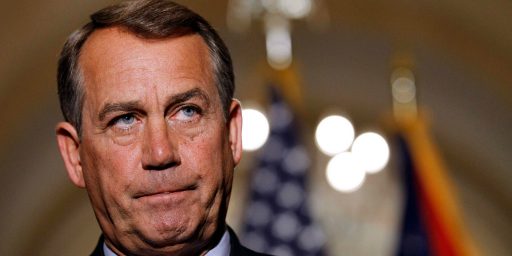Are The Markets Starting To Notice How Messed Up Things Are In Washington?
Signs that investors are starting to get nervous about the lack of action coming out of Washington.
So far at least, the response of investors on Wall Street to the ongoing government shutdown, and the impending breach of America’s debt ceiling, has been rather muted. For the most part, financial analysts say that this is largely because professional investors believe that they’ve been through this before and that, in the end, Congress and the President always end up coming up with some kind of deal in the end. The longer the shutdown lasts and the closer we get to the debt ceiling deadline (according to CNN’s handy dandy countdown clock we’re just over 200 hours away from that event), the less likely those self-assurances are likely to sound, and the more likely it is that we’ll see Wall Street start to react negatively. Perhaps then, everyone in Washington will finally start taking this seriously.
Over at The Washington Post, Neil Irwin thinks he sees signs that Wall Street may be waking up the what could be a new reality:
A lot of the market indicators of how much the financial world is worrying about a debt default have been quite calm over the last week. The Standard & Poor’s 500 index, for example, is only about 1 percent below its close eight days ago, when the government shutdown began.
But in the less widely followed — but in many ways more important — market for Treasury bills, things are starting to get scary. These are short-term IOU’s of the U.S. government, bills issued for 30, 60 or 90 days. They enable Uncle Sam to manage cash flow much the way a homeowner might use a credit card. They also form the backbone of trillions of dollars in transactions: Major corporations and banks use them as a place to park short-term cash; they are held by money market mutual funds; and they serve as collateral for millions of transactions in markets around the world.
Normally, the interest rate the government pays on bills is around the same as the short-term interest rates in other money markets (for example, the interest rates banks charge each other for overnight cash, or the interest rate that the Federal Reserve targets). Both of those are near zero right now, which is why on Sept. 30, eight days ago, the interest rate on Treasury bills maturing Oct. 17 was a mere 0.03 percent. Nothing, in other words.
But since then, the possibility that the Treasury might have trouble paying or might not be able to pay its bills over the next few weeks has grown — and the interest rate has skyrocketed. It was at 0.16 percent at Monday’s close. On Tuesday the rate so far has been almost double that, as high as 0.297 percent.
Irwin provides this chart for the T-Bills that will be maturing on October 31st:
Irwin also cites this report from Reuters that money managers, the people how manage money market and other funds for example, may be starting to avoid short-term U.S. debt because of the uncertainty starting to creep into the market:
(Reuters) – The $2.66 trillion money market industry is preparing for the worst as lawmakers in Washington battle over the U.S. debt ceiling.
The funds, including those run by PIMCO, Federated Investors Inc and the largest money fund sponsor – Fidelity Investments – are shying away from government debt that matures in the next few months and keeping more cash on hand to help them withstand any delays in the U.S. paying its creditors.
So far, investors have not been rushing to yank their money from the funds, as many still expect that Republicans will come to an agreement with Democrats over the nation’s borrowing limit and avert a default. The U.S. Treasury expects to exhaust all of its remaining borrowing capacity by October 17.
But if the United States fails to raise its debt limit and repay maturing debt, panicky investors may look to raise cash, in part by withdrawing from money market funds. The funds would have to find ways to pay back their investors, either with cash they have on hand or by selling assets. The industry could face one of its biggest tests since the financial crisis forced the government to provide emergency support to the industry.
It’s not hard to imagine that this could only be the beginning of a move by investors that could pose problems for the Treasury Department’s ability to raise short-term cash going forward. The closer we get to the Treasury Department’s “drop dead” date without a resolution of the debt ceiling issue, the more likely it is that uncertainty is going to creep into the money markets. In that instance, investors will either be less likely to participate in Treasury auctions, which will result in the interest rates on the bonds having to be raised in order to attract buyers, or they’ll demand higher interest rates in the first place. In either case, the impact will remain the same and higher interest rates will likely reverberate throughout the T-Bill markets and, if it lasts long enough, to the economy as a whole. Increased uncertainty could also lead holders of Money Market Accounts to begin pulling money out of their accounts, which would require fund managers to sell off more bonds in order meet the cash requirements they need to satisfy redemption requests. This was precisely the kind of scenario that nearly caused a collapse of money markets in the wake of the 2008 financial crisis.
The other possible reaction to the looming uncertainty coming out of Washington is that we’d see stocks and other non-Treasury investments decline as investors move their assets into safer investments. Ironically, even with the uncertainty that breaching the debt ceiling will inevitably create, that would likely include T-Bills, although it’s likely that in that case you’d see investors move to longer-term bonds on the theory that it would be unlikely that Washington would allow a debt ceiling breach to continue for very long. In that case, the real damage would be to 401k and IRS balances, which of course took a massive hit of their own during the 2008 crisis. In that case, the damage for bonds would be largely confined to the short-term market one would assume.
More broadly, CNBC observes that Wall Street analysts are reluctantly coming to the conclusion that this time things may not turn out okay in the end:
Wall Street experts, who only a few days ago dismissed a debt default as a near-impossibility, are now having to come to grips with a worst-case scenario that no longer seems so far-fetched.
Consensus opinion had it that Washington politicians, for all their partisan rancor, would never be so irresponsible as to allow the U.S. to miss even a debt interest payment.
But with both sides recalcitrant and no progress made in negotiations, strategists and economists are beginning to caution clients that the probability of default is rising.
“The likelihood of an amicable settlement of the looming debt ceiling deadline appears highly questionable,” Wells Fargo strategists Paul J. Mangus and Darrell Cronk said in a report.
“This is not to say that the winds of politics might not shift in the next two weeks, but the markets are becoming increasingly skeptical over the recent level of discord in Congress,” they added. “This suggests that, at least in the short-term, we can expect more episodic swings of market volatility than usual.”
The change in analyst tone may not necessarily be reflected in market behavior yet, but some dynamics are changing.
One-year Treasury credit default swaps—the cost of insuring U.S. debt—have seen prices surge, with Tuesday alone seeing a 10 percent rise. An auction for three-year notes Tuesday was mediocre, with the lowest demand since June.
Also, the CBOE Volatility Index, a popular gauge of market fear, gained more than 6 percent and eclipsed the 20 mark, considered a dividing line for significant levels of investor unease. The VIX had last breached 20 in June 2012 amid intensifying fears over the European debt crisis.
Equity market indexes such as the S&P 500 have been in a slow, orderly melt lower and seem to be waiting for a reason to rally.
At the same time, they continue to downplay the idea that we’re heading for catastrophe:
“Speculation that a limited default by the U.S. government would lead to a bigger financial and economic crisis than the collapse of Lehman Brothers is surely overdone,” Jessop said in an analysis. “The crucial difference is that the U.S. government would still be a going concern, with all the tax and spending powers of a sovereign state.”
Still, he said that doesn’t mean there would be no effects.
“While we continue to think that default will probably be avoided, it would be unwise to rule anything out,” Jessop said. “A prolonged period of uncertainty would clearly be negative for the global economy and for the prices of risky assets. Nonetheless, the bottom line is that the U.S. government is not Lehman.”
This much is true, although it’s worth noting that the U.S. Government only has “the tax and spending powers of a sovereign state” if Congress authorizes the same. If a debt ceiling debacle occurs at the same time that the ability of the Federal Government to tax and spend is hamstrung by even the limited shutdown we’re living through right now, it’s unclear what the consequences might be, or what kind of uncertainty might be introduced into the markets.
Whichever way the market reacts, though, it’s becoming rather obvious that there’s no way that there’s not going to be some damage inflicted by a debt ceiling breach, and that it’s likely to become apparent long before we hit the October 17th deadline that the Treasury Department has set. Considering that this date is now only nine days away, perhaps it’s only a loud and clear message from the financial markets that will cause Congress, primarily the Republicans, to act on the debt ceiling.






I think for some time there was a presumption that this was mostly theatre and that when push came to shove, there’s no way we’d actually default. I think most investors probably still believe that, but the probability of default has been upgraded to “non-zero.” So folks get jittery.
Similar from Business Insider, if a interest payment is delayed, the S&P could lose 45% of it’s value.
Folks are running from the Bond Markets.
But I don’t think the Baggers really care.
They are in pursuit of their ideological wet-dream…and are damn happy about it. (turning Japanese, even?)
This from the Daily Beast:
http://www.thedailybeast.com/articles/2013/10/08/extremely-conservative-and-incredibly-out-of-touch.html
The radical Conservatives have been predicting for almost 5 years now that the economy was going to crash, and interest rates were going to spike. But the fact that they themselves are trying to turn that prediction into a self-fulfilling prophecy will almost surely be totally lost on them. Rule #1 is, no matter what happens, it’s Obama’s fault.
I’m generally an optimistic person, but this time I’m a little scared.
As much as we might like to play the “who’s getting the blame” game, the reality is that if things really go seriously to hell in a handbasket, it’s not inconceivable that the Tea Party could actually end up being more powerful a year or two from now. People who are angry and scared often react irrationally. Stranger things could happen.
If the thought of President Rand Paul taking office as we enter the 4th year of the second great depression doesn’t scare you, then I don’t know what would.
Boehner just spoke…and says that a clean CR would be unconditional surrender.
So they started this…and now refuse to stop it…because it would make them look bad.
Perhaps they should have thought this through a couple weeks ago instead of just listening to Ted Cruz.
@ Todd
but this time I’m a little scared.
After listening to Fox for an hour or so yesterday, so am I. The message was:
A. Default – not a big deal
B. If anything bad happens, it’s all Obama’s fault
Very simply, the morons want the economy to crash.
They figure the public will blame Obama.
@al-Ameda:
Of course they do, they’ve been buying gold and guns for 5 years. They’re gonna feel pretty dumb if the economic apocalypse doesn’t arrive soon. Better to just cause it themselves then risk looking dumb.
In your other post you discussed that bargaining on the issue is not new even though you did not posit what the GOP is bargaining about- I wonder if this type market reaction is unique and perhaps you will reconsider whether what the GOP is doing does constitute a radical paradigm shift based on the market reaction.
I looked a bit at doing some options trading because I think the downside risk is starting to get real. But it’s just counter to my long-term investment strategy that I’ve believed in for 30 years.
I do have more cash right now that I typically would. If we (well, OK, they!) manage to ‘just’ tank the Dow temporarily, I could see some great buying opportunities. I lived through the ’87 Black Monday and can probably stomach another rollercoaster.
But if this triggers a global return to recession, or even depression, then I’m just about as screwed as the average joe with maybe $25,000 in a retirement fund somewhere that will, thanks to the GOP, have maybe $15 or $10K post-debacle.
If things go that bad, will people just blame the GOP? Will people still accept our overall government structure and system??
At this point, shouldn’t everyone be asking the GOP Reps to resign if they don’t want to do their jobs? Seriously, the debt ceiling threat cannot be treated as normal politics.
What have they accomplished since the ’10 midterms?
Limited the rights of women.
Dropped the countries credit rating.
Climate change is worse because of them.
The economy is recovering like molasses because of them.
Resigning would be the right thing…good for the country for sure.
@C. Clavin:
Those are different. This is literally “Give us what we want or we’ll tank the economy.” It’s unacceptable.
They’re dogmatic fundamentalists attempting to impose an ideology based on myths and lies.
They’ve turned their back on Conservatism.
They are radicals intent on bringing on the end times.
They are positively giddy over the damage they are doing.
So yeah…unacceptable.
As if the End Times is/are a real thing.
The Republicans picked this fight. They picked the nature of this fight; they picked the timing of this fight.
Now, calling it off because the stakes are too high is considered ‘unconditional surrender’.
It is just sociopathic.
If this is one of the ledes in the NYT this morning – and they weren’t worried – they really need to cut down on the Ambien.
This quote explains the Republican Party better than any I’ve seen yet. His reply is a corker, by the way.